定语从句whose是一个表示所属关系的词
- 格式:doc
- 大小:26.00 KB
- 文档页数:7
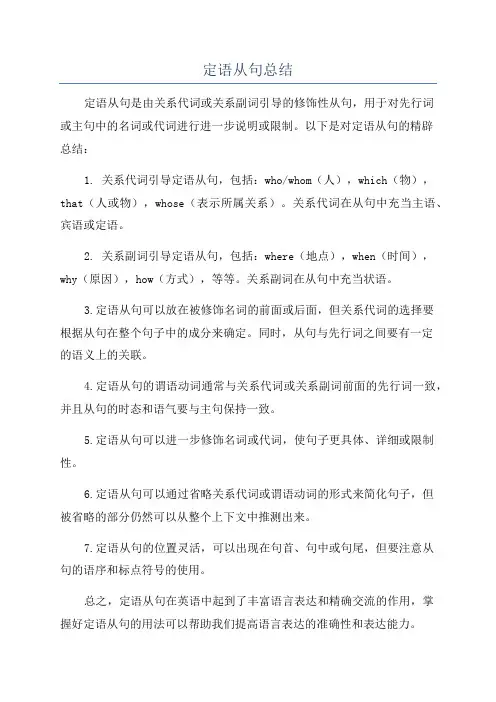
定语从句总结
定语从句是由关系代词或关系副词引导的修饰性从句,用于对先行词
或主句中的名词或代词进行进一步说明或限制。
以下是对定语从句的精辟
总结:
1. 关系代词引导定语从句,包括:who/whom(人),which(物),that(人或物),whose(表示所属关系)。
关系代词在从句中充当主语、宾语或定语。
2. 关系副词引导定语从句,包括:where(地点),when(时间),why(原因),how(方式),等等。
关系副词在从句中充当状语。
3.定语从句可以放在被修饰名词的前面或后面,但关系代词的选择要
根据从句在整个句子中的成分来确定。
同时,从句与先行词之间要有一定
的语义上的关联。
4.定语从句的谓语动词通常与关系代词或关系副词前面的先行词一致,并且从句的时态和语气要与主句保持一致。
5.定语从句可以进一步修饰名词或代词,使句子更具体、详细或限制性。
6.定语从句可以通过省略关系代词或谓语动词的形式来简化句子,但
被省略的部分仍然可以从整个上下文中推测出来。
7.定语从句的位置灵活,可以出现在句首、句中或句尾,但要注意从
句的语序和标点符号的使用。
总之,定语从句在英语中起到了丰富语言表达和精确交流的作用,掌
握好定语从句的用法可以帮助我们提高语言表达的准确性和表达能力。
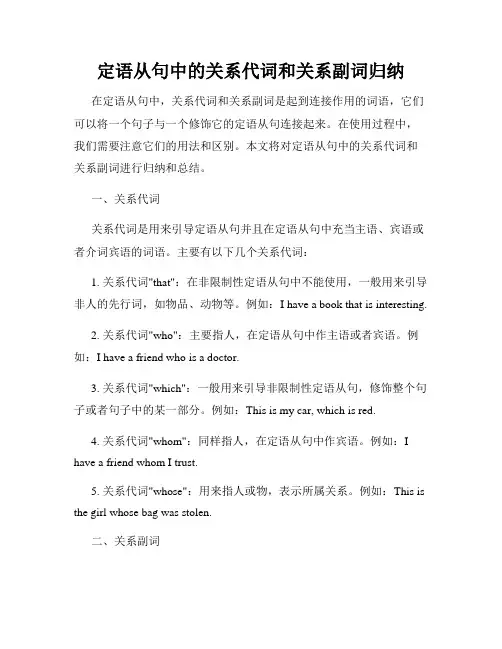
定语从句中的关系代词和关系副词归纳在定语从句中,关系代词和关系副词是起到连接作用的词语,它们可以将一个句子与一个修饰它的定语从句连接起来。
在使用过程中,我们需要注意它们的用法和区别。
本文将对定语从句中的关系代词和关系副词进行归纳和总结。
一、关系代词关系代词是用来引导定语从句并且在定语从句中充当主语、宾语或者介词宾语的词语。
主要有以下几个关系代词:1. 关系代词"that":在非限制性定语从句中不能使用,一般用来引导非人的先行词,如物品、动物等。
例如:I have a book that is interesting.2. 关系代词"who":主要指人,在定语从句中作主语或者宾语。
例如:I have a friend who is a doctor.3. 关系代词"which":一般用来引导非限制性定语从句,修饰整个句子或者句子中的某一部分。
例如:This is my car, which is red.4. 关系代词"whom":同样指人,在定语从句中作宾语。
例如:I have a friend whom I trust.5. 关系代词"whose":用来指人或物,表示所属关系。
例如:This is the girl whose bag was stolen.二、关系副词关系副词是用来引导定语从句并且在定语从句中表示地点、时间、程度、原因等关系的副词。
主要有以下几个关系副词:1. 关系副词"where":表示地点,在定语从句中修饰名词。
例如:This is the place where we met.2. 关系副词"when":表示时间,在定语从句中修饰名词。
例如:This is the day when we first met.3. 关系副词"how":表示方式或程度,在定语从句中修饰名词。
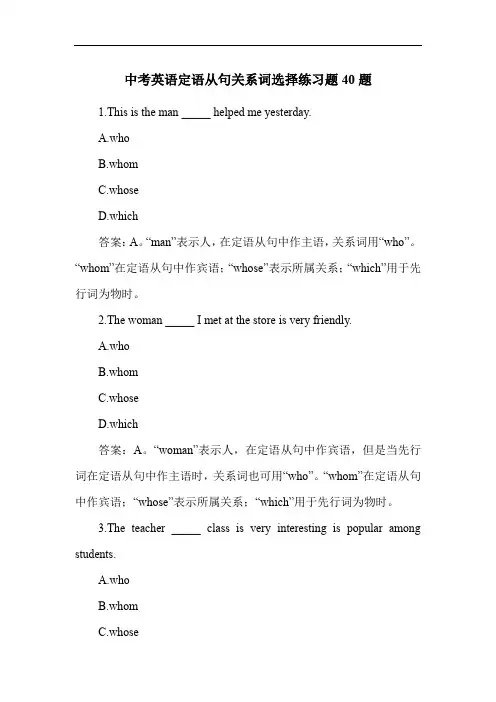
中考英语定语从句关系词选择练习题40题1.This is the man _____ helped me yesterday.A.whoB.whomC.whoseD.which答案:A。
“man”表示人,在定语从句中作主语,关系词用“who”。
“whom”在定语从句中作宾语;“whose”表示所属关系;“which”用于先行词为物时。
2.The woman _____ I met at the store is very friendly.A.whoB.whomC.whoseD.which答案:A。
“woman”表示人,在定语从句中作宾语,但是当先行词在定语从句中作主语时,关系词也可用“who”。
“whom”在定语从句中作宾语;“whose”表示所属关系;“which”用于先行词为物时。
3.The teacher _____ class is very interesting is popular among students.A.whoB.whomC.whose答案:C。
“teacher”表示人,后面“class”与“teacher”是所属关系,所以用“whose”。
“who”和“whom”不能表示所属关系;“which”用于先行词为物时。
4.The boy _____ mother is a doctor studies very hard.A.whoB.whomC.whoseD.which答案:C。
“boy”表示人,“mother”与“boy”是所属关系,用“whose”。
“who”和“whom”不能表示所属关系;“which”用于先行词为物时。
5.The girl _____ I talked to is from Canada.A.whoB.whomC.whoseD.which答案:B。
“girl”表示人,在定语从句中作宾语,用“whom”。
“who”在定语从句中作主语;“whose”表示所属关系;“which”用于先行词为物时。
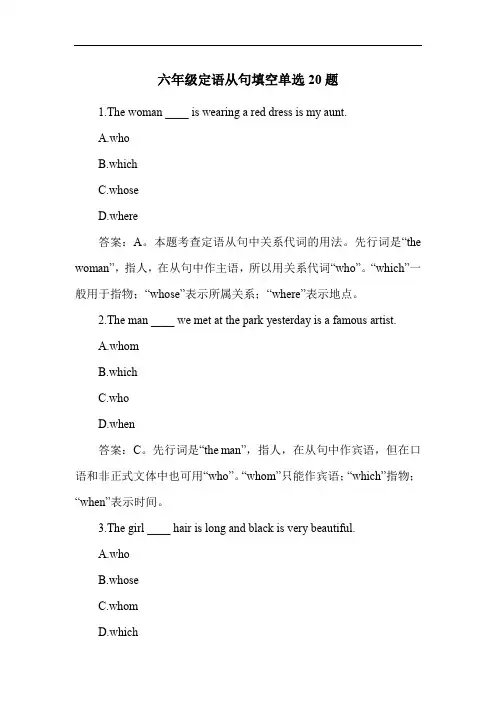
六年级定语从句填空单选20题1.The woman ____ is wearing a red dress is my aunt.A.whoB.whichC.whoseD.where答案:A。
本题考查定语从句中关系代词的用法。
先行词是“the woman”,指人,在从句中作主语,所以用关系代词“who”。
“which”一般用于指物;“whose”表示所属关系;“where”表示地点。
2.The man ____ we met at the park yesterday is a famous artist.A.whomB.whichC.whoD.when答案:C。
先行词是“the man”,指人,在从句中作宾语,但在口语和非正式文体中也可用“who”。
“whom”只能作宾语;“which”指物;“when”表示时间。
3.The girl ____ hair is long and black is very beautiful.A.whoB.whoseC.whomD.which答案:B。
先行词是“the girl”,“hair”与“the girl”是所属关系,所以用“whose”。
“who”和“whom”在从句中只能代表人;“which”指物。
4.The teacher ____ teaches us English is very kind.A.whoB.whichC.whoseD.whom答案:A。
先行词是“the teacher”,指人,在从句中作主语,用“who”。
“which”指物;“whose”表示所属关系;“whom”只能作宾语。
5.The boy ____ I helped yesterday is very grateful.A.whoB.whichC.whoseD.whom答案:D。
先行词是“the boy”,指人,在从句中作宾语,所以用“whom”。
“who”在从句中作主语;“which”指物;“whose”表示所属关系。
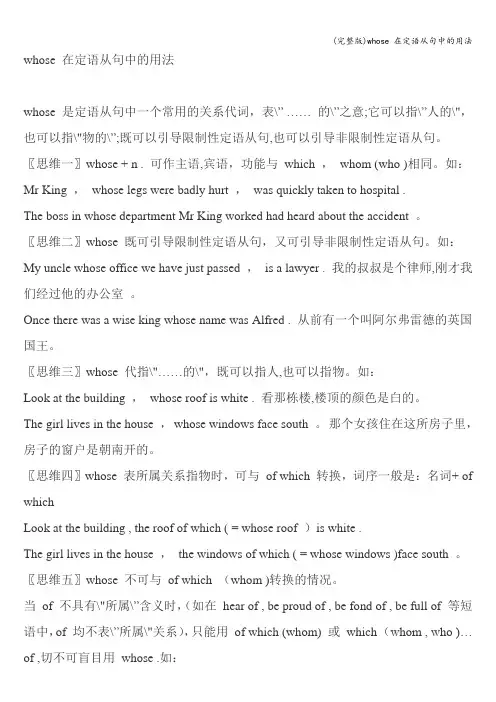
whose 在定语从句中的用法whose 是定语从句中一个常用的关系代词,表\” …… 的\”之意;它可以指\”人的\",也可以指\"物的\”;既可以引导限制性定语从句,也可以引导非限制性定语从句。
〖思维一〗whose + n . 可作主语,宾语,功能与which ,whom (who )相同。
如:Mr King ,whose legs were badly hurt ,was quickly taken to hospital .The boss in whose department Mr King worked had heard about the accident 。
〖思维二〗whose 既可引导限制性定语从句,又可引导非限制性定语从句。
如:My uncle whose office we have just passed ,is a lawyer . 我的叔叔是个律师,刚才我们经过他的办公室。
Once there was a wise king whose name was Alfred . 从前有一个叫阿尔弗雷德的英国国王。
〖思维三〗whose 代指\"……的\",既可以指人,也可以指物。
如:Look at the building ,whose roof is white . 看那栋楼,楼顶的颜色是白的。
The girl lives in the house ,whose windows face south 。
那个女孩住在这所房子里,房子的窗户是朝南开的。
〖思维四〗whose 表所属关系指物时,可与of which 转换,词序一般是:名词+ of whichLook at the building , the roof of which ( = whose roof )is white .The girl lives in the house ,the windows of which ( = whose windows )face south 。
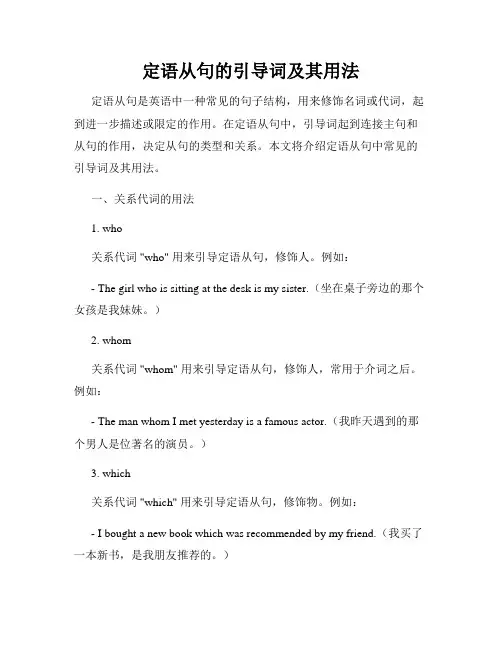
定语从句的引导词及其用法定语从句是英语中一种常见的句子结构,用来修饰名词或代词,起到进一步描述或限定的作用。
在定语从句中,引导词起到连接主句和从句的作用,决定从句的类型和关系。
本文将介绍定语从句中常见的引导词及其用法。
一、关系代词的用法1. who关系代词 "who" 用来引导定语从句,修饰人。
例如:- The girl who is sitting at the desk is my sister.(坐在桌子旁边的那个女孩是我妹妹。
)2. whom关系代词 "whom" 用来引导定语从句,修饰人,常用于介词之后。
例如:- The man whom I met yesterday is a famous actor.(我昨天遇到的那个男人是位著名的演员。
)3. which关系代词 "which" 用来引导定语从句,修饰物。
例如:- I bought a new book which was recommended by my friend.(我买了一本新书,是我朋友推荐的。
)4. whose关系代词 "whose" 用来引导定语从句,表示所属关系。
例如:- The boy whose father is a doctor wants to be a scientist.(那个父亲是医生的男孩想成为一名科学家。
)5. that关系代词 "that" 用来引导定语从句,修饰人或物,可用于非限制性定语从句。
例如:- The car that Tom bought is very expensive.(汤姆买的那辆车很贵。
)二、关系副词的用法1. when关系副词 "when" 用来引导表示时间的定语从句。
例如:- I still remember the day when we first met.(我仍然记得我们第一次见面的那一天。
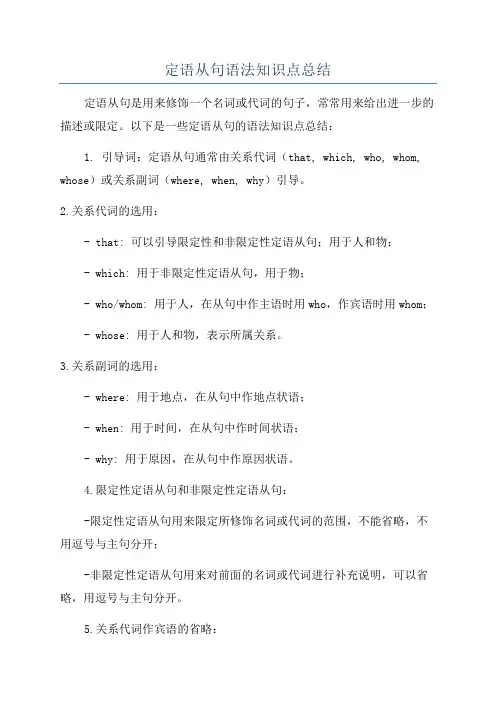
定语从句语法知识点总结定语从句是用来修饰一个名词或代词的句子,常常用来给出进一步的描述或限定。
以下是一些定语从句的语法知识点总结:1. 引导词:定语从句通常由关系代词(that, which, who, whom, whose)或关系副词(where, when, why)引导。
2.关系代词的选用:- that: 可以引导限定性和非限定性定语从句;用于人和物;- which: 用于非限定性定语从句,用于物;- who/whom: 用于人,在从句中作主语时用who,作宾语时用whom;- whose: 用于人和物,表示所属关系。
3.关系副词的选用:- where: 用于地点,在从句中作地点状语;- when: 用于时间,在从句中作时间状语;- why: 用于原因,在从句中作原因状语。
4.限定性定语从句和非限定性定语从句:-限定性定语从句用来限定所修饰名词或代词的范围,不能省略,不用逗号与主句分开;-非限定性定语从句用来对前面的名词或代词进行补充说明,可以省略,用逗号与主句分开。
5.关系代词作宾语的省略:- 当关系代词在定语从句中作宾语时,可以省略:即省略关系代词that/which/who/whom,但要保留动词的宾语位置。
6.关系代词和关系副词在定语从句中的不同作用:-关系代词在定语从句中充当一个成分,可以作主语、宾语、表语等;-关系副词在定语从句中充当一个状语,只能作时间、地点或原因状语。
7.先行词和定语从句的一致性:-关系代词的单复数和人称应与其在定语从句中的先行词保持一致;- 关系代词whose引导的定语从句是表示所属关系的,后面的先行词是被关系代词修饰的名词。
需要注意的是,定语从句的位置可以是句首、句中或句尾,要根据具体情况进行调整。
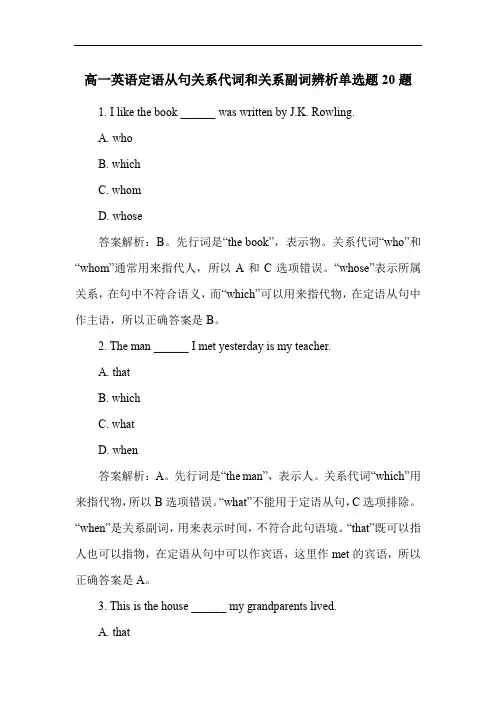
高一英语定语从句关系代词和关系副词辨析单选题20题1. I like the book ______ was written by J.K. Rowling.A. whoB. whichC. whomD. whose答案解析:B。
先行词是“the book”,表示物。
关系代词“who”和“whom”通常用来指代人,所以A和C选项错误。
“whose”表示所属关系,在句中不符合语义,而“which”可以用来指代物,在定语从句中作主语,所以正确答案是B。
2. The man ______ I met yesterday is my teacher.A. thatB. whichC. whatD. when答案解析:A。
先行词是“the man”,表示人。
关系代词“which”用来指代物,所以B选项错误。
“what”不能用于定语从句,C选项排除。
“when”是关系副词,用来表示时间,不符合此句语境。
“that”既可以指人也可以指物,在定语从句中可以作宾语,这里作met的宾语,所以正确答案是A。
3. This is the house ______ my grandparents lived.A. thatB. whichC. whereD. who答案解析:C。
先行词是“the house”,表示地点。
“that”和“which”在定语从句中通常作主语或宾语,但此句中从句缺少的是表示地点的状语。
“who”用来指代人,不符合要求。
“where”是关系副词,在定语从句中作地点状语,表示“在……地方”,所以正确答案是C。
4. Do you know the girl ______ hair is very long?A. whoB. whichC. whoseD. that答案解析:C。
先行词是“the girl”,表示人。
从句中“hair”是属于女孩的,需要一个表示所属关系的关系代词。
“who”和“that”在定语从句中主要作主语或宾语,不能表示所属关系。
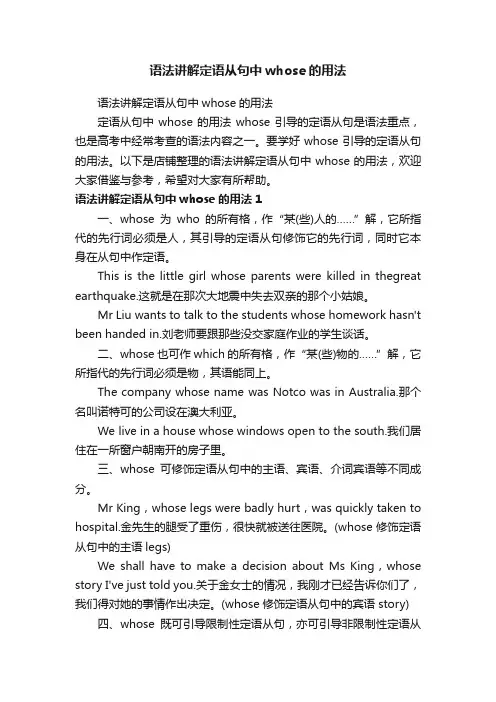
语法讲解定语从句中whose的用法语法讲解定语从句中whose的用法定语从句中whose的用法whose引导的定语从句是语法重点,也是高考中经常考查的语法内容之一。
要学好whose引导的定语从句的用法。
以下是店铺整理的语法讲解定语从句中whose的用法,欢迎大家借鉴与参考,希望对大家有所帮助。
语法讲解定语从句中whose的用法1一、whose为who的所有格,作“某(些)人的……”解,它所指代的先行词必须是人,其引导的定语从句修饰它的先行词,同时它本身在从句中作定语。
This is the little girl whose parents were killed in thegreat earthquake.这就是在那次大地震中失去双亲的那个小姑娘。
Mr Liu wants to talk to the students whose homework hasn't been handed in.刘老师要跟那些没交家庭作业的学生谈话。
二、whose也可作which的所有格,作“某(些)物的……”解,它所指代的先行词必须是物,其语能同上。
The company whose name was Notco was in Australia.那个名叫诺特可的公司设在澳大利亚。
We live in a house whose windows open to the south.我们居住在一所窗户朝南开的房子里。
三、whose可修饰定语从句中的主语、宾语、介词宾语等不同成分。
Mr King,whose legs were badly hurt,was quickly taken to hospital.金先生的腿受了重伤,很快就被送往医院。
(whose修饰定语从句中的主语legs)We shall have to make a decision about Ms King,whose story I've just told you.关于金女士的情况,我刚才已经告诉你们了,我们得对她的事情作出决定。
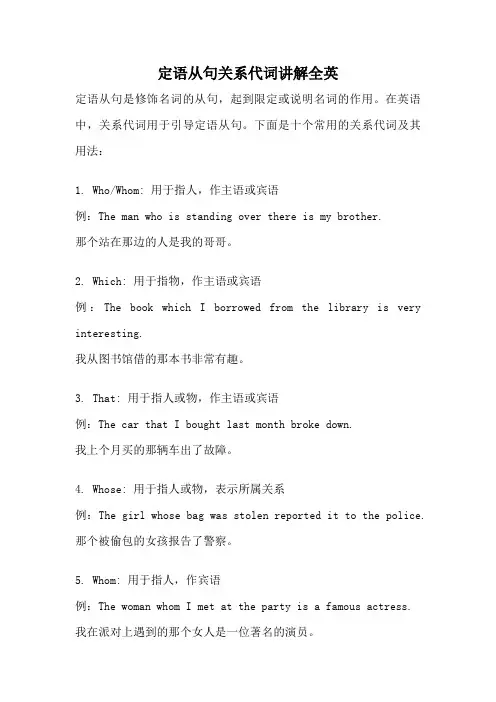
定语从句关系代词讲解全英定语从句是修饰名词的从句,起到限定或说明名词的作用。
在英语中,关系代词用于引导定语从句。
下面是十个常用的关系代词及其用法:1. Who/Whom: 用于指人,作主语或宾语例:The man who is standing over there is my brother.那个站在那边的人是我的哥哥。
2. Which: 用于指物,作主语或宾语例:The book which I borrowed from the library is very interesting.我从图书馆借的那本书非常有趣。
3. That: 用于指人或物,作主语或宾语例:The car that I bought last month broke down.我上个月买的那辆车出了故障。
4. Whose: 用于指人或物,表示所属关系例:The girl whose bag was stolen reported it to the police.那个被偷包的女孩报告了警察。
5. Whom: 用于指人,作宾语例:The woman whom I met at the party is a famous actress.我在派对上遇到的那个女人是一位著名的演员。
6. Where: 用于指地点,在定语从句中作状语例:This is the school where I studied when I was a child.这是我小时候上学的学校。
7. When: 用于指时间,在定语从句中作状语例:The day when we met for the first time is still vivid in my memory.我们第一次见面的那一天在我的记忆中仍然很鲜活。
8. Why: 用于指原因,在定语从句中作状语例:The reason why he got angry is still unknown to me.他生气的原因我仍然不知道。
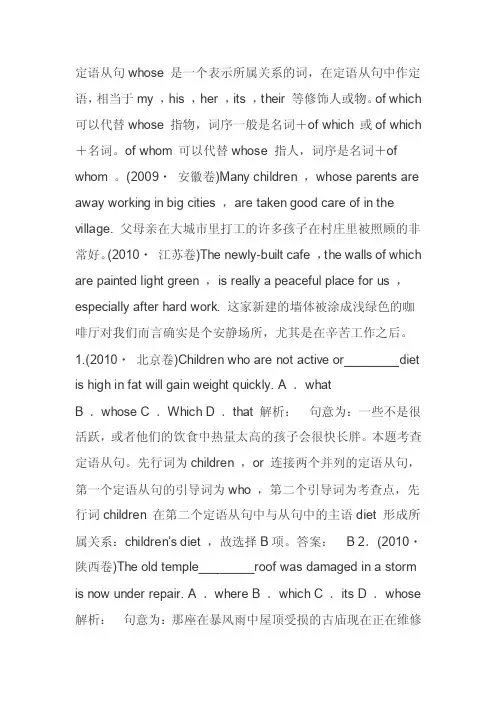
定语从句whose 是一个表示所属关系的词,在定语从句中作定语,相当于my ,his ,her ,its ,their 等修饰人或物。
of which 可以代替whose 指物,词序一般是名词+of which 或of which +名词。
of whom 可以代替whose 指人,词序是名词+of whom 。
(2009・安徽卷)Many children ,whose parents are away working in big cities ,are taken good care of in the village. 父母亲在大城市里打工的许多孩子在村庄里被照顾的非常好。
(2010・江苏卷)The newly-built cafe ,the walls of which are painted light green ,is really a peaceful place for us ,especially after hard work. 这家新建的墙体被涂成浅绿色的咖啡厅对我们而言确实是个安静场所,尤其是在辛苦工作之后。
1.(2010・北京卷)Children who are not active or________diet is high in fat will gain weight quickly. A .whatB .whoseC .WhichD .that 解析:句意为:一些不是很活跃,或者他们的饮食中热量太高的孩子会很快长胖。
本题考查定语从句。
先行词为children ,or 连接两个并列的定语从句,第一个定语从句的引导词为who ,第二个引导词为考查点,先行词children 在第二个定语从句中与从句中的主语diet 形成所属关系:children’s d iet ,故选择B项。
答案: B 2.(2010・陕西卷)The old temple________roof was damaged in a storm is now under repair. A .where B .which C .its D .whose 解析:句意为:那座在暴风雨中屋顶受损的古庙现在正在维修当中。
定语从句之关系代词用法(II)引导定语从句的关系代词有:who、whom(指人)、which(指物)、that、whose (人物双指)。
其各自用法如下:一、who、whom及whosewho、whom、whose作为关系代词既可以引导限制性定语从句,也可以引导非限制性定语从句,其先行词主要指人,其中whose也可指物。
关系代词在定语从句中作主语时用who,作宾语或表语时用whom或who,表示所属关系时用whose。
1.、.who和whom的区别:不能用whom在从句中作主语,只能作宾语或表语。
而who作主语、宾语、表语均可。
例如:a) The girl who we supposed was drowned came back.= The girl who , we supposed , was drowned came back.b) The girl who/whom we supposed drowned came back.(2)whom在作动词或介词宾语时,特别是在口语中,一般省去,或用who、that 代替。
而在以介词结尾的定语从句中最好不用whom。
例如:a) I think you should stay faithful to the person whom you're married to . (×)上面一句一般被认为是不正确的,宜改为:b) I think you should stay faithful to the person who/that you’re married to .(口语中)c) I think you should stay faithful to the person you’re married to .d) I think you should stay faithful to the person to whom you’re married .(正式文体中)(3)在非限制性定语从句中,最好whom用作宾语,且不能省略。
定语从句中的关系代词和关系副词定语从句是英语语法中一个重要的概念,用于修饰或限制一个名词。
在定语从句中,关系代词和关系副词起着关键的作用。
本文将详细介绍关系代词和关系副词的用法和特点,并通过例子来说明。
一、关系代词(Relative Pronouns)关系代词用来引导定语从句,用于连接主句和从句,同时在从句中充当名词的作用。
常见的关系代词有:that, which, who, whom, whose。
1. that: 可以指代人或物,用来引导限制性定语从句,即从句中的信息是必需的。
例句:- I bought a book that is very interesting.(我买了一本非常有趣的书。
)2. which: 只能指代物,用来引导非限制性定语从句,即从句中的信息是附加的。
例句:- My car, which is red, was stolen yesterday.(我的车,它是红色的,昨天被偷了。
)3. who: 只能指代人,用来引导限制性定语从句,即从句中的信息是必需的。
例句:- The woman who is sitting over there is my teacher.(那个坐在那里的女人是我的老师。
)4. whom: 只能指代人,用来引导非限制性定语从句,即从句中的信息是附加的。
例句:- The girl, whom I met yesterday, is a famous actress.(那个我昨天见到的女孩是位著名的演员。
)5. whose: 可以指代人或物,引导定语从句,表示所属关系。
例句:- I have a friend whose father is a doctor.(我有一个朋友,他的父亲是个医生。
)关系代词的选择要根据其先行词的性质来确定,同时需要注意该从句在整个句子中的成分。
二、关系副词(Relative Adverbs)关系副词也是引导定语从句的一种形式,它们在从句中充当副词的作用。
关系代词连接两个句子
关系代词在英语中通常用于连接两个句子,使它们成为一个完整的复合句。
以下是几种常见的关系代词:
1. who:用于指代人,在定语从句中充当主语或宾语。
例如:The man who was standing at the counter is my teacher.(站在柜台的那个人是我的老师。
)
2. whom:用于指代人,在定语从句中充当宾语。
例如:The man whom I saw yesterday is my neighbor.(我昨天见到的那个人是我的邻居。
)
3. which:用于指代物,在定语从句中充当主语或宾语。
例如:The car which was parked in front of my house is red.(停在我家前面的那辆车是红色的。
)
4. that:用于指代人和物,在定语从句中充当主语、宾语或表语。
例如:The person that I met at the party last night was very interesting.(昨晚在聚会上我遇到的那个人非常有趣。
)
5. whose:用于指代人或物,在定语从句中充当定语,表示所属关系。
例如:The boy whose father is a doctor is my classmate.(他爸爸是医生的那个男孩是我的同学。
)。
whose的定语从句用法“whose”是一个关系代词,用于引导定语从句,表示所属关系。
它指示名词的所有者或所属关系,常用来修饰人或物。
以下是关于“whose”的用法的详细回答。
一、用法概述:1. “whose”可用于修饰人、动物或物体,表示所属关系。
在定语从句中,它可以代替所有格形式的名词或名词短语。
例如:- This is the girl whose brother saved my life.(这是那个救过我的弟弟的女孩。
)- I saw a dog whose tail was wagging happily.(我看到了一只尾巴摇得很高兴的狗。
)2. “whose”在定语从句中可作主语、宾语或介词宾语,其后跟着一个名词或名词短语。
例如:- The man whose car was stolen reported it to the police.(车被偷的那个人把情况报告给了警察。
)- We visited the family whose house had burned down.(我们去拜访了那个房子被烧毁的家庭。
)3. “whose”引导的定语从句可以放在句子的不同位置。
例如:- We met T om, whose parents are doctors.(我们见到了汤姆,他的父母是医生。
)- Whose book is this?(这是谁的书?)- The woman, whose cat scratched my arm, apologized to me.(那个抓伤了我的胳膊的女人向我道歉。
)二、“whose”引导的定语从句的位置:1. 定语从句在主句之后,用逗号和关系代词“whose”隔开。
例如:- My sister, whose husband is a famous actor, lives in Los Angeles.2. 定语从句在主句之中,用逗号和关系代词“whose”隔开。
作定语的关系代词一、whose关系代词whose在定语从句中作定语。
whose可以看成是who的所有格。
当先行词与从句中的某个名词有所属关系,表达“……的”意思时用关系代词whose。
它既可以指人也可以指物,既可引导限定性定语从句也可引导非限定性定语从句。
Mr King, whose legs were badly hurt, was taken to the hospital.金先生腿受伤严重,被送进了医院。
They lived in a room whose window opens to the south.他们住在一间窗户朝南开的房间。
Whose+名词有时作介词的宾语,构成“介词+whose+名词”结构引导定语从句,并在从句中作成分In 1980 he caught a serious illness from whose effects he still suffers. 1980年他患了到现在对他仍有影响的重病。
The boss in whose department Mr. King worked had heard about the accident.金先生工作所在的部门领导已经听人说过这一意外事故。
二、whichwhich有时也可用作定语,尤其用于“介词+which+名词”这类结构中,此时的which含有this或that的意味。
如:1. Mark was a student at the university from 1999 to 2003, during which time he studied very hard and was made chairman of the Students’ Union.2. The postman comes at 6:30 in the morning, at which time I am usually fast asleep. 邮递员早晨6点30分来,这个时候我通常还睡着大觉呢。
定语从句中关系代词的选择定语从句是英语中一种常见的修饰结构,通过引导词(关系代词)来连接主句和从句,进一步修饰名词或代词。
在选择关系代词时,需要根据从句在主句中所起的作用以及先行词的词性和含义进行判断。
本文将探讨定语从句中关系代词的选择。
一、关系代词的种类与用法定语从句中常用的关系代词有:that, who, which, whom, whose。
它们在从句中的作用及用法如下:1. that: 用于指物的定语从句中,可以做主语或宾语。
例句:I have a friend that/whom I trust deeply.(我有一个我深信不疑的朋友)2. who: 用于指人的定语从句中,多用作主语。
例句:She is the girl who won the first prize.(她是获得一等奖的那个女孩)3. which: 用于指物的定语从句中,多用作主语或宾语。
例句:He was reading a book which interested him.(他正在读一本他感兴趣的书)4. whom: 用于指人的定语从句中,多用作宾语。
例句:I know a doctor whom you can trust.(我认识一个你可以信任的医生)5. whose: 用于指人或物的定语从句中,表示所属关系。
例句:This is the man whose car was stolen.(这是那个车被偷的人)二、关系代词的正确选择在选择关系代词时,需要注意以下几点:1. 先行词的词性:根据先行词是人还是物选择关系代词,如人用who或whom,物用that或which。
2. 关系代词在从句中的作用:如果关系代词在从句中作宾语,则选择that、whom或which;如果是主语,可选择that、who或which。
3. 介词后的关系代词:如果介词放在从句中,需使用介词+关系代词,如介词+whom、in which、to whom等。
定语从句whose 是一个表示所属关系的词,在定语从句中作定语,相当于my ,his ,her ,its ,their 等修饰人或物。
of which 可以代替whose 指物,词序一般是名词+of which 或of which +名词。
of whom 可以代替whose 指人,词序是名词+of whom 。
(2009・安徽卷)Many children ,whose parents are away working in big cities ,are taken good care of in the village. 父母亲在大城市里打工的许多孩子在村庄里被照顾的非常好。
(2010・江苏卷)The newly-built cafe ,the walls of which are painted light green ,is really a peaceful place for us ,especially after hard work. 这家新建的墙体被涂成浅绿色的咖啡厅对我们而言确实是个安静场所,尤其是在辛苦工作之后。
1.(2010・北京卷)Children who are not active or________diet is high in fat will gain weight quickly. A .whatB .whoseC .WhichD .that 解析:句意为:一些不是很活跃,或者他们的饮食中热量太高的孩子会很快长胖。
本题考查定语从句。
先行词为children ,or 连接两个并列的定语从句,第一个定语从句的引导词为who ,第二个引导词为考查点,先行词children 在第二个定语从句中与从句中的主语diet 形成所属关系:children’s d iet ,故选择B项。
答案: B 2.(2010・陕西卷)The old temple________roof was damaged in a storm is now under repair. A .where B .which C .its D .whose 解析:句意为:那座在暴风雨中屋顶受损的古庙现在正在维修当中。
本题考查定语从句的用法。
此句先行词是the old temple ,代入定语从句后为:The_old_temple’s roof was damaged in a storm. 由此可知先行词在定语从句中作定语,故用关系代词whose 引导。
答案: D 3.(2010・浙江卷)The settlement is home to nearly 1,000 people ,many of________left their village homes for a better life in the city. A .whom B .which C .them D .those 解析:句意为:近千人在这一小社区居住,他们当中很多都是从农村老家来城市寻求更好的日子的。
本题考查定语从句。
先行词为1 000 people ,代入定语从句为many of 1,000 people left their village homes for a better life in the city ,关系代词在从句中作介词of 的宾语且指人,故用whom 。
答案: A 1 .与定语从句中的动词构成搭配。
The man (who/whom/that)I talked about at the meeting is from Beijing University. =The man about whom I talked at the meeting is from Beijing University. 在会议中我与他谈话的那个人是从北京大学来的。
注意:但是在下面一句中for 不可以提前,因为look for 是动词词组。
This is the person(who/whom/that)you are looking for. 这就是你找的那个人。
2.与定语从句所修饰的先行词构成搭配。
He built a telescope ,through which he could study the skies. 他架起一架望远镜,通过它他可以研究天空。
In the dark street ,there wasn’t a single person to whom she could turn for help. 在漆黑的大街上没有一个人能为她提供帮助。
3 .of +which/whom 表示所属关系。
(表所属关系也可用whose) Recently I bought an ancient vase ,the price of which ( =whose price) was very reasonable. 最近我买了个古代的花瓶,它的价钱很合理。
1.(2011・龙岩检测)At 13 ,Samuel received a training course in drawing for three years ,________he got a good opportunity for further development.A .after thatB .after whichC .after itD .after this 解析:考查定语从句。
after which he got a good opportunity for further development 是非限制性定语从句。
答案: B 2.(2010・上海卷)Wind power is an ancient source of energy________we may return in the near future. A .on which B .by which C .to which D .from which 解析:句意为:风力是很古老的一种能源,不久的将来我们也许会再利用它。
考查定语从句。
return to 重新利用,属于固定搭配。
故排除含有介词on ,by 和from 的A、B、D项。
答案: C 3.(2011・东北三校一模)There are 51 students in Class Three ,________failed in the test. A .all of which B .all of them C .none of whom D .none of them 解析:考查定语从句。
后半句是非限制性定语从句,修饰先行词students ,应用whom 引导。
因为前后两句之间没有并列连词,所以B、D两项不正确。
答案: C point ,situation ,case 等,从表面上看它们不是表地点的,但却表示类似地点的意义,因此它们作先行词时,如果引导词在从句中作状语,那么这个引导词要用where ;如果不作状语,则用关系代词that/which 。
(2009・福建卷)It’s helpful to put children in a situation where they can see themselves different.(where 作状语) 把孩子放在一个能使他们从另外一个角度认识自己的环境中对他们有益。
Now there is just one point that/which I wish you make quite clear.(which/that 作宾语)现在只有一点我希望你弄清楚。
1.(2011・云南检测)―Do you have anything to say for yourselves? ―Yes ,there’s one point________we must insist on. A .why B .where C .how D ./ 解析:the point 作介词on 的宾语,因此应选用关系代词或者省略。
答案: D 2.(2009・浙江卷)I have reached a point in my life________I am supposed to make decisions of my own. A .whichB .whereC .howD .why 解析:句意为:我已经到了应该自己作决定的那个人生阶段。
where 引导定语从句修饰先行词point 。
答案: B 3.(2010・北京朝阳期中)The doctor said that the treatment would continue until the patient reached the point________he could walk correctly and safely. A .where B .when C .which D .that 解析:point 为先行词,后面为定语从句,在定语从句中walk 为不及物动词,从句不缺少宾语,且表时间故用when 引导。
句意为:医生说,病人的治疗要持续到他能够安全稳当地行走为止。
答案: B 1 .as 与which 都可以代指主句中的一部分或整个句子的内容,有时可以互换。
He married her ,as (which) was natural. 很自然地,他和她结婚了。
(2009・山东卷)Whenever I met her ,which was fairly often ,she greeted me with a sweet smile. 不管我何时遇见她,她都用甜甜的微笑迎接我,这是常事儿。
2.但在下列情况下一般只能用as 。
(1)as 引导的定语从句可以放在句首,而which 则不能。
As we know ,more than seventy percent of the earth is covered with water. 正如我们所知,地球表面的70% 以上被水覆盖。
(2)as 表示“正如,正像”,而which 无此意。
此时,as 从句中常有know ,expect ,happen ,point out ,plan ,suggest 等单词或短语。
He came back home late ,as we expected. 正如我们所料,他回家晚了。
(3) 当先行词被the same ,such 修饰时,定语从句需用as 引导。
I bought the same book as you have. 我买了一本跟你一样的书。
I’ll give you such things as you may need. 我将给你你需要的东西。